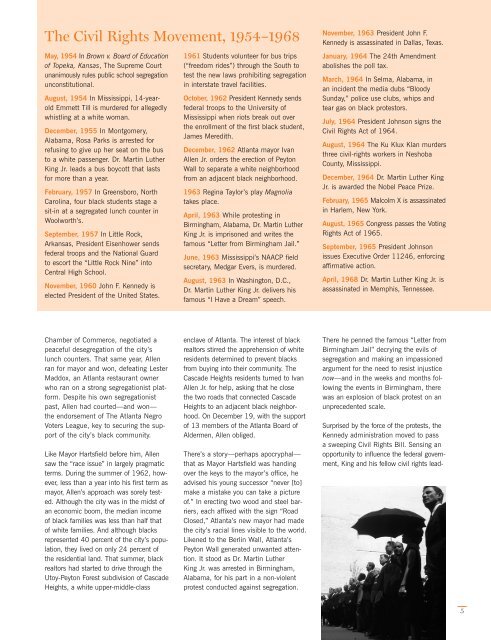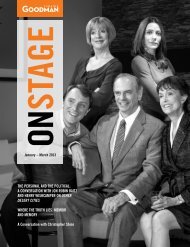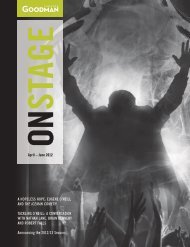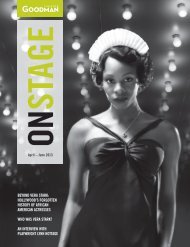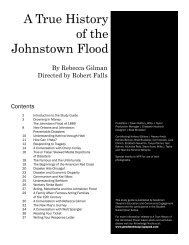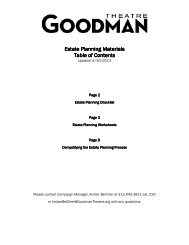Magnolia, atlanta and dr. Martin luther king jr. a ... - Goodman Theatre
Magnolia, atlanta and dr. Martin luther king jr. a ... - Goodman Theatre
Magnolia, atlanta and dr. Martin luther king jr. a ... - Goodman Theatre
You also want an ePaper? Increase the reach of your titles
YUMPU automatically turns print PDFs into web optimized ePapers that Google loves.
The Civil Rights Movement, 1954–1968<br />
May, 1954 In Brown v. Board of Education<br />
of Topeka, Kansas, The Supreme Court<br />
unanimously rules public school segregation<br />
unconstitutional.<br />
August, 1954 In Mississippi, 14-yearold<br />
Emmett Till is murdered for allegedly<br />
whistling at a white woman.<br />
December, 1955 In Montgomery,<br />
Alabama, Rosa Parks is arrested for<br />
refusing to give up her seat on the bus<br />
to a white passenger. Dr. <strong>Martin</strong> Luther<br />
King Jr. leads a bus boycott that lasts<br />
for more than a year.<br />
February, 1957 In Greensboro, North<br />
Carolina, four black students stage a<br />
sit-in at a segregated lunch counter in<br />
Woolworth’s.<br />
September, 1957 In Little Rock,<br />
Arkansas, President Eisenhower sends<br />
federal troops <strong>and</strong> the National Guard<br />
to escort the “Little Rock Nine” into<br />
Central High School.<br />
November, 1960 John F. Kennedy is<br />
elected President of the United States.<br />
1961 Students volunteer for bus trips<br />
(“freedom rides”) through the South to<br />
test the new laws prohibiting segregation<br />
in interstate travel facilities.<br />
October, 1962 President Kennedy sends<br />
federal troops to the University of<br />
Mississippi when riots break out over<br />
the enrollment of the first black student,<br />
James Meredith.<br />
December, 1962 Atlanta mayor Ivan<br />
Allen Jr. orders the erection of Peyton<br />
Wall to separate a white neighborhood<br />
from an adjacent black neighborhood.<br />
1963 Regina Taylor’s play <strong>Magnolia</strong><br />
takes place.<br />
April, 1963 While protesting in<br />
Birmingham, Alabama, Dr. <strong>Martin</strong> Luther<br />
King Jr. is imprisoned <strong>and</strong> writes the<br />
famous “Letter from Birmingham Jail.”<br />
June, 1963 Mississippi’s NAACP field<br />
secretary, Medgar Evers, is murdered.<br />
August, 1963 In Washington, D.C.,<br />
Dr. <strong>Martin</strong> Luther King Jr. delivers his<br />
famous “I Have a Dream” speech.<br />
November, 1963 President John F.<br />
Kennedy is assassinated in Dallas, Texas.<br />
January, 1964 The 24th Amendment<br />
abolishes the poll tax.<br />
March, 1964 In Selma, Alabama, in<br />
an incident the media dubs “Bloody<br />
Sunday,” police use clubs, whips <strong>and</strong><br />
tear gas on black protestors.<br />
July, 1964 President Johnson signs the<br />
Civil Rights Act of 1964.<br />
August, 1964 The Ku Klux Klan murders<br />
three civil-rights workers in Neshoba<br />
County, Mississippi.<br />
December, 1964 Dr. <strong>Martin</strong> Luther King<br />
Jr. is awarded the Nobel Peace Prize.<br />
February, 1965 Malcolm X is assassinated<br />
in Harlem, New York.<br />
August, 1965 Congress passes the Voting<br />
Rights Act of 1965.<br />
September, 1965 President Johnson<br />
issues Executive Order 11246, enforcing<br />
affirmative action.<br />
April, 1968 Dr. <strong>Martin</strong> Luther King Jr. is<br />
assassinated in Memphis, Tennessee.<br />
Chamber of Commerce, negotiated a<br />
peaceful desegregation of the city’s<br />
lunch counters. That same year, Allen<br />
ran for mayor <strong>and</strong> won, defeating Lester<br />
Maddox, an Atlanta restaurant owner<br />
who ran on a strong segregationist platform.<br />
Despite his own segregationist<br />
past, Allen had courted—<strong>and</strong> won—<br />
the endorsement of The Atlanta Negro<br />
Voters League, key to securing the support<br />
of the city’s black community.<br />
Like Mayor Hartsfield before him, Allen<br />
saw the “race issue” in largely pragmatic<br />
terms. During the summer of 1962, however,<br />
less than a year into his first term as<br />
mayor, Allen’s approach was sorely tested.<br />
Although the city was in the midst of<br />
an economic boom, the median income<br />
of black families was less than half that<br />
of white families. And although blacks<br />
represented 40 percent of the city’s population,<br />
they lived on only 24 percent of<br />
the residential l<strong>and</strong>. That summer, black<br />
realtors had started to <strong>dr</strong>ive through the<br />
Utoy-Peyton Forest subdivision of Cascade<br />
Heights, a white upper-middle-class<br />
enclave of Atlanta. The interest of black<br />
realtors stirred the apprehension of white<br />
residents determined to prevent blacks<br />
from buying into their community. The<br />
Cascade Heights residents turned to Ivan<br />
Allen Jr. for help, as<strong>king</strong> that he close<br />
the two roads that connected Cascade<br />
Heights to an adjacent black neighborhood.<br />
On December 19, with the support<br />
of 13 members of the Atlanta Board of<br />
Aldermen, Allen obliged.<br />
There’s a story—perhaps apocryphal—<br />
that as Mayor Hartsfield was h<strong>and</strong>ing<br />
over the keys to the mayor’s office, he<br />
advised his young successor “never [to]<br />
make a mistake you can take a picture<br />
of.” In erecting two wood <strong>and</strong> steel barriers,<br />
each affixed with the sign “Road<br />
Closed,” Atlanta’s new mayor had made<br />
the city’s racial lines visible to the world.<br />
Likened to the Berlin Wall, Atlanta’s<br />
Peyton Wall generated unwanted attention.<br />
It stood as Dr. <strong>Martin</strong> Luther<br />
King Jr. was arrested in Birmingham,<br />
Alabama, for his part in a non-violent<br />
protest conducted against segregation.<br />
There he penned the famous “Letter from<br />
Birmingham Jail” decrying the evils of<br />
segregation <strong>and</strong> ma<strong>king</strong> an impassioned<br />
argument for the need to resist injustice<br />
now—<strong>and</strong> in the weeks <strong>and</strong> months following<br />
the events in Birmingham, there<br />
was an explosion of black protest on an<br />
unprecedented scale.<br />
Surprised by the force of the protests, the<br />
Kennedy administration moved to pass<br />
a sweeping Civil Rights Bill. Sensing an<br />
opportunity to influence the federal government,<br />
King <strong>and</strong> his fellow civil rights lead-<br />
5


